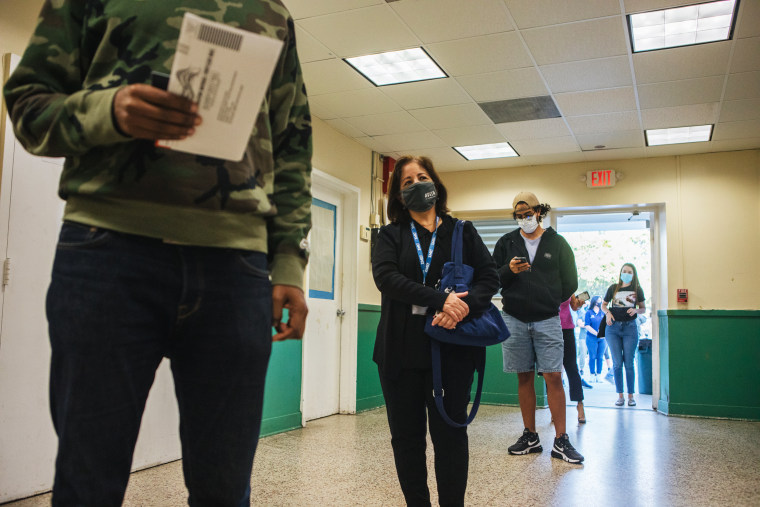There's no shortage of problems with Georgia's newly passed anti-voting law, but one provision has understandably drawn the most attention.
"If you want any indication that it has nothing to do with fairness, nothing to do with decency -- they passed a law saying you can't provide water for people standing in line while they're waiting to vote," President Joe Biden told reporters late last week. "You don't need anything else to know that this is nothing but punitive design to keep people from voting. You can't provide water for people about to vote? Give me a break."
Even Sen. Lindsey Graham (R-S.C.), appearing on Fox News over the weekend, said this element of the new law "doesn't make a whole lot of sense to me."
Nevertheless, as NBC News reported yesterday, it's against this backdrop that Florida Republicans are prepared to follow Georgia Republicans' lead.
Florida Republicans are considering a bill that would effectively make it a crime to give voters food or drink, including water, within 150 feet of polling places. According to the text of an elections bill introduced last week, state law currently prohibits offering voters assistance within 100 feet of polling locations; H.B. 7041 proposes expanding that zone to 150 feet and includes a prohibition on giving "any item" to voters or "interacting or attempting to interact" with voters within that zone.
To resolve any ambiguities, one GOP state legislator explicitly said during a committee meeting last week that bans on "any item" would include "food or beverages."
When pressed, Republican proponents of such bans tend to argue that the policy has a benign purpose: those waiting in line to vote shouldn't have to deal with last-minute lobbying from candidates, parties, and activists. And at first blush, this may seem like a legitimate, apolitical goal.
But in practice, the defense is not to be taken seriously. There's an obvious, qualitative difference between handing someone waiting in line to vote campaign materials and handing that voter a bottle of water or a slice of pizza.
The practical reality is, in one election cycle after another, we see long voting lines -- too often in communities of color -- in which Americans are forced to wait for hours simply to participate in their own democracy. To give those voters some food or something to drink is to exercise basic human decency in response to voting lines that shouldn't exist in the first place.
But if those voters are forced to wait for hours without sustenance, it's more likely that some will simply give up and go home without having cast a ballot -- which is almost certainly what's motivating some Republican legislators to pursue such measures.
What's more, let's not overlook the fact that this isn't the only change Florida Republicans have in mind. NBC News' report added, "H.B. 7041, which was recommended by an elections committee last Wednesday along party lines, is 44 pages long and contains a number of other election restrictions. It would require voters to request mail ballots more frequently, add more identification requirements for mail voting, and limit how drop boxes are used."
In case this isn't obvious, there were no problems with Florida's system of elections in 2020. Indeed, GOP leaders in the state had reason to be pleased with the results: Donald Trump won the Sunshine State by a few points, and Republican congressional candidates managed to flip two U.S. House seats. Georgia Republicans at least have an excuse: Democrats won some key races, making an attack on voting rights inevitable. For Florida Republicans, however, nothing needed "fixing."
That said, Florida remains a competitive battleground; it will hold key statewide contests in 2022; and with so many Republicans eagerly embracing the party's Big Lie, the stage was set for unnecessary new hurdles between Floridians and the franchise, which may give the GOP an added edge in the next round of elections.
Marc Elias, a leading attorney in the field of election law, told the Washington Post's Greg Sargent yesterday, "It appears that Florida Republicans have looked at the outrage aimed at Georgia's suppression law with envy rather than disgust."

